
Timeline
Title
Country/Nationality
Flavius Josephus
Titus Flavius Josephus was a first-century Romano-Jewish historian who was born in Jerusalem—then part of Roman Judea—to a father of priestly descent and a mother who claimed royal ancestry.
Born into one of Jerusalem's elite families, Josephus introduces himself in Greek as Iōsēpos (Ιώσηπος), son of Matthias, an ethnic Jewish priest. He was the second-born son of Matthias (Mattiyah or Mattityahu in Hebrew). His older full-blooded brother was also called Matthias. Their mother was an aristocratic woman who descended from the royal and formerly ruling Hasmonean dynasty. Josephus's paternal grandparents were Josephus and his wife—an unnamed Hebrew noblewoman, distant relatives of each other and direct descendants of Simon Psellus. Josephus's family was wealthy. He descended through his father from the priestly order of the Jehoiarib, which was the first of the 24 orders of priests in the Temple in Jerusalem. Josephus was a descendant of the High Priest of Israel Jonathan Apphus. He was raised in Jerusalem and educated alongside his brother.
In his mid-twenties, he traveled to negotiate with Emperor Nero for the release of some Jewish priests. Upon his return to Jerusalem, at the outbreak of the First Jewish–Roman War, Josephus was appointed the military governor of Galilee. His arrival in Galilee, however, was fraught with internal division: the inhabitants of Sepphoris and Tiberias opting to maintain peace with the Romans; the people of Sepphoris enlisting the help of the Roman army to protect their city, whilst the people of Tiberias appealing to King Agrippa's forces to protect them from the insurgents. Josephus also contended with John of Gischala who had also set his sight over the control of Galilee. Like Josephus, John had amassed to himself a large band of supporters from Gischala (Gush Halab) and Gabara, including the support of the Sanhedrin in Jerusalem. Meanwhile, Josephus fortified several towns and villages in Lower Galilee, among which were Tiberias, Bersabe, Selamin, Japha, and Tarichaea, in anticipation of a Roman onslaught. In Upper Galilee, he fortified the towns of Jamnith, Seph, Mero, and Achabare, among other places. Josephus, with the Galileans under his command, managed to bring both Sepphoris and Tiberias into subjection, but was eventually forced to relinquish his hold on Sepphoris by the arrival of Roman forces under Placidus the tribune and later by Vespasian himself. Josephus first engaged the Roman army at a village called Garis, where he launched an attack against Sepphoris a second time, before being repulsed. At length, he resisted the Roman army in its siege of Yodfat (Jotapata) until it fell to the Roman army in the lunar month of Tammuz, in the thirteenth year of Nero's reign.
After the Jewish garrison of Yodfat fell under siege, the Romans invaded, killing thousands; the survivors committed suicide. According to Josephus, he was trapped in a cave with 40 of his companions in July 67 CE. The Romans (commanded by Flavius Vespasian and his son Titus, both subsequently Roman emperors) asked the group to surrender, but they refused. According to Josephus's account, he suggested a method of collective suicide; they drew lots and killed each other, one by one, and Josephus happened to be one of two men that were left who surrendered to the Roman forces and became prisoners. In 69 CE, Josephus was released. According to his account, he acted as a negotiator with the defenders during the siege of Jerusalem in 70 CE, during which time his parents were held as hostages by Simon bar Giora.
While being confined at Yodfat (Jotapata), Josephus claimed to have experienced a divine revelation that later led to his speech predicting Vespasian would become emperor. After the prediction came true, he was released by Vespasian, who considered his gift of prophecy to be divine. Josephus wrote that his revelation had taught him three things: that God, the creator of the Jewish people, had decided to "punish" them; that "fortune" had been given to the Romans; and that God had chosen him "to announce the things that are to come".[31][32][33] To many Jews, such claims were simply self-serving.
In 71 CE, he went to Rome in the entourage of Titus, becoming a Roman citizen and client of the ruling Flavian dynasty (hence he is often referred to as Flavius Josephus). In addition to Roman citizenship, he was granted accommodation in conquered Judaea and a pension. While in Rome and under Flavian patronage, Josephus wrote all of his known works. Although he uses "Josephus", he appears to have taken the Roman praenomen Titus and nomen Flavius from his patrons.
Vespasian arranged for Josephus to marry a captured Jewish woman, whom he later divorced. About 71 CE, Josephus married an Alexandrian Jewish woman as his third wife. They had three sons, of whom only Flavius Hyrcanus survived childhood. Josephus later divorced his third wife. Around 75 CE, he married his fourth wife, a Greek Jewish woman from Crete, who was a member of a distinguished family. They had a happy married life and two sons, Flavius Justus and Flavius Simonides Agrippa.
Josephus's life story remains ambiguous. He was described by Harris in 1985 as a law-observant Jew who believed in the compatibility of Judaism and Graeco-Roman thought, commonly referred to as Hellenistic Judaism. Before the 19th century, the scholar Nitsa Ben-Ari notes that his work was banned as those of a traitor, whose work was not to be studied or translated into Hebrew. His critics were never satisfied as to why he failed to commit suicide in Galilee, and after his capture, accepted the patronage of Romans.
Mary Smallwood is one of many historians who write critically of Josephus:
[Josephus] was conceited, not only about his own learning, but also about the opinions held of him as commander both by the Galileans and by the Romans; he was guilty of shocking duplicity at Jotapata, saving himself by sacrifice of his companions; he was too naive to see how he stood condemned out of his own mouth for his conduct, and yet no words were too harsh when he was blackening his opponents; and after landing, however involuntarily, in the Roman camp, he turned his captivity to his own advantage, and benefited for the rest of his days from his change of side.
Author Joseph Raymond calls Josephus "the Jewish Benedict Arnold" for betraying his own troops at Jotapata.
Books by Flavius Josephus
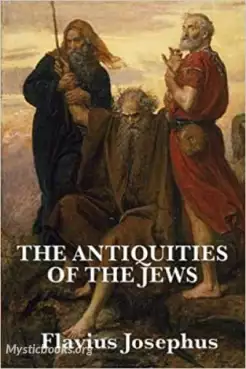
The Antiquities of the Jews, Volume 1
Antiquities of the Jews is a 20-volume historiographical work, written in Greek, by the Jewish historian Flavius Josephus in the 13th year of the reign of Roman emperor Flavius Domitian which was around AD 93 or 94. Antiquities of the Jews contains a...
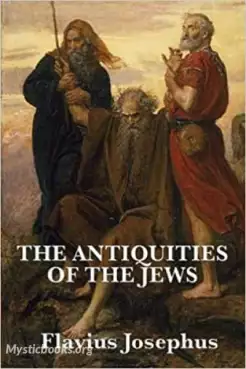
The Antiquities of the Jews, Volume 2
Antiquities of the Jews is a 20-volume historiographical work, written in Greek, by the Jewish historian Flavius Josephus in the 13th year of the reign of Roman emperor Flavius Domitian which was around AD 93 or 94. Antiquities of the Jews contains a...
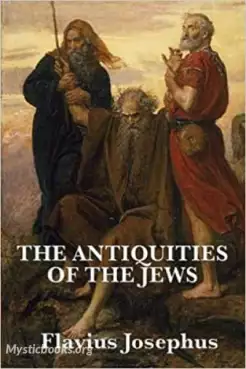
The Antiquities of the Jews, Volume 3
Antiquities of the Jews is a 20-volume historiographical work, written in Greek, by the Jewish historian Flavius Josephus in the 13th year of the reign of Roman emperor Flavius Domitian which was around AD 93 or 94. Antiquities of the Jews contains a...
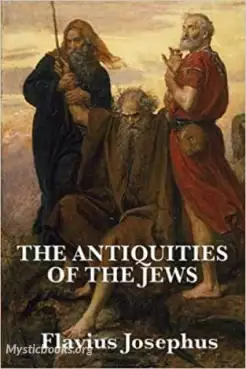
The Antiquities of the Jews, Volume 4
Antiquities of the Jews is a 20-volume historiographical work, written in Greek, by the Jewish historian Flavius Josephus in the 13th year of the reign of Roman emperor Flavius Domitian which was around AD 93 or 94. Antiquities of the Jews contains a...

Minor Works of Josephus
There are 3 parts to this collection. Against Apion is a two-volume defence of Judaism as classical religion and philosophy, stressing its antiquity, as opposed to what Josephus claimed was the relatively more recent tradition of the Greeks. Some...
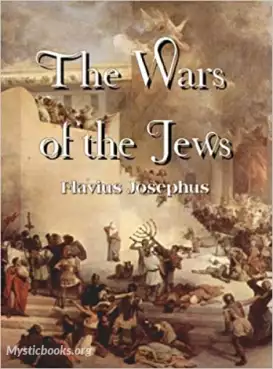
The Wars of the Jews
The Jewish War or Judean War also referred to in English as The Wars of the Jews, is a book written by Josephus, a first-century Roman-Jewish historian. It has been described by Steve Mason as "perhaps the most influential non-biblical text of Wester...

Selections from Josephus
Journey into the annals of ancient history as Flavius Josephus, a renowned Jewish historian, offers a captivating glimpse into the tumultuous times of the first century in "Selections from Josephus." Delve into the gripping narratives, tumultuous eve...